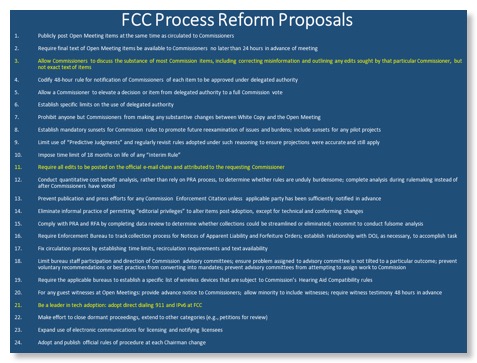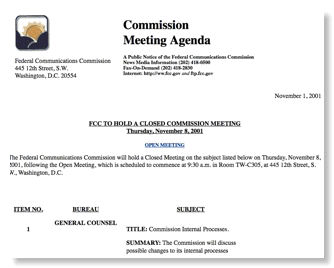Comm. O'Reilly on FCC Reform
Can't We Have BOTH Commissioner Control and High Throughput?

On July 8th, Comm. O'Reilly published in the FCC's blog a post entitled "Snapshot of Process Reform Ideas" giving the 24 proposals listed above. He says that the ones indicated in yellow "have been adopted in whole or in part".
Presidential appointment certificate

§4(i),(j) clearly states "The Commission may perform any and all acts, make such rules and regulations, and issue such orders, not inconsistent with this chapter, as may be necessary in the execution of its functions…The Commission may conduct its proceedings in such manner as will best conduce to the proper dispatch of business and to the ends of justice." (This is supplemented by the role of Chairman as described in §5.)
The 5 commissioners should work out among themselves a modus operandi that is both efficient and meets the requirements of the statute. They don't need us to cheer them on - often in partisan ways. As I have noted before, FCC could use occasional closed Commission meetings from time to time to discuss internal processes and their improvement. The Government in Sunshine Act generally requires open meetings for multiple member agencies BUT there are exceptions. Specifically 5 USC § 552b(c)(2) provides one for meeting that "relate solely to the internal personnel rules and practices of an agency". As far as I can tell, the last time there was an FCC closed meeting on any matter was the one announced below on November 1, 2001:
While the proposals of Comm. O'Reilly would certainly lead to more commissioner involvement in FCC decision, nothing is said about whether they would increase throughput or possibly decrease it. While some may feel that FCC throughput in areas such as net neutrality and STB regulation should decrease, an unintended side effect might be to decrease throughput in all policy areas of FCC jurisdiction. As we have discussed before and discuss below, FCC throughput in spectrum policy is already too low and is threatening innovation. The cellular industry;s demand for action on #HighBand Spectrum this week as well as NAB's demands for quick action on ATSC 3.0 show there is support for fast FCC action in some areas of its jurisdiction. Indeed, recurring dismissal of thousands of proceedings because they are "stale" is not an accomplishment — rather a sign of a current deep productivity problem.
But let me also address Comm. O'Reilly's point #21 - "Be a leader in tech adoption: adopted direct dialing 911 and iPv6 at FCC" - which he appears to classify as having "been adopted in whole or in part". Perhaps these 2 specific tasks have now been accomplished, but does this make FCC "a leader in tech adoption"? Yes, new technologies are being approved as no doubt 24+ GHz 5G will be this week. Yes, FCC moved quickly on ATSC 3.0 in response to NAB's petition and requested comments a mere 6 weeks after the petition. But petitions for new technology that do not come from CTIA or NAB often just gather dust for years! 30 years after its adoption the Commission has no coherent explanation of how it deals with the new technology provisions of §7 or any guidance for regulatees on submitting such requests. Indeed, at least one prominent private lawyer believes that anyone seeking to use the provisions of §7 will be punished with extra delay!
While it is easy to just think cynically that CTIA get special treatment because it is so important and that no one else should reasonably expect such treatment, we have pointed out that in the case of cellular booster interference to cellular systems (Docket 10-4) even CTIA had to wait 10 years from when they first stated to FCC that "urgent action is needed"! In the case of FM broadcast interference to nearby 700 MHz cellular base stations FCC apparently refused to take any action or even make a statement on the problem (which appears to be condoned by ambiguities in the present FCC Rules) and verbally told the affected parties to solve it themselves. So while CTIA may be the prodigal child, FCC productivity is so low now in spectrum policy even this prodigal child appears to have choice of getting what they want in new spectrum or getting their interference problems solved - but not both!
Prominent spectrum lawyer Mitchell Lazarus pointed out in comments in the "Wireless Innovation NOI", Docket 09-157 - which itself has been stalled for years and theoretically still open - that even noncontroversial marginal innovations on existing services often stall for YEARS at FCC if they need Commission action for a waiver or rule change. I could also point out that both the IEEE-USA request for a declaratory ruling on technology above 95 GHz and their status under §7 as well as the more specific request from Battelle Memorial Institute for Part 101 service rules in the virgin spectrum at 102-109.5 GHz have both been stalled for years at FCC without any resolution.
Does this make FCC "a leader in tech adoption"?
What do you think its impact has been on capital formation for R&D in cutting edge wireless technology - other than specific technologies favored by the cellular industry?
I have discussed this low productivity in spectrum policy for innovative technology and its shortfall with respect to demands ifor spectrum policy in a paper at last year's TPRC. To put it simply, it is as if the demand for spectrum policy is equivalent to 6,000 pages of FCC decisions each year, but the 8th Floor deliberation process as presently structured can only produce 4,000 pages. I don't see anything in the Comm. O'Reilly's reform ideas that would increase the throughput of the 8th floor about the present perhaps 4,000 pages/year. He has previously written about his "right to vote" but not about the implications of high level deliberation on esoteric matters.
Should the issue really be that the 5 commissioners can vote on the most important issues that they categorize as such?
Then leave the other issues that have to be resolved to the staff to handle under delegated authority in order to get the people's business done in a timely way? If the commissioners want to vote on the wireless competition reports to Congress, why not? However to meet real productivity requirements and goals the will have to get less involved in more obscure matters to which they - and their present staff - often add little value. These are often technocratic matters in spectrum policy such as allowing any licensed or unlicensed use above 95 GHz - a limit reached by FCC in 2003.
If the board of directors of General Motors chose to try to control the firm by voting on every design change of every model, next year's Chevy could never be produced on time. Similarly at FCC there is a tradeoff between level of direct involvement of commissioners and agency productivity/timeliness.
.While UK's Ofcom Board is not exactly the same as the commissioners under our legislation, it has found ways to both delegate most decisions to the Ofcom staff under clear general policy guidelines and to have real oversight of the staff. FCC's delegations of authority to its staff have changed little in decades and focus mainly on precedent, not on significance, let alone the impact of a longer 8th Floor deliberation. Should FCC, or at least the FCC of the next administration, fundamentally review its delegation of authority structure?
Having spent nearly $1M on an outside study of field enforcement in recent history, shouldn't improving FCC policy productivity be more important?




![Validate my RSS feed [Valid RSS]](valid-rss-rogers.png)

